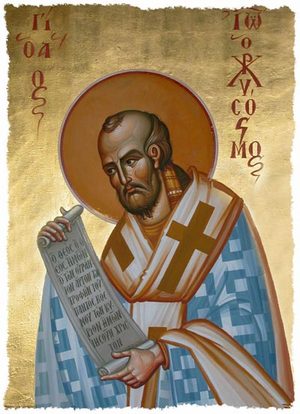September 13th is the liturgical memorial of Saint John Chrysostom, one of the Church’s greatest bishops ever known. The word “Chrysostom” is a nickname meaning “golden mouth” given to John as archbishop of Constantinople (present day Istanbul) to honor his gift in preaching Jesus Christ. The saint lived (347-407) in an era much like our own with some people living a tepid discipleship with the Lord and weak morals. Saint John’s preaching was based on sacred Scripture and the Tradition of the Church; his sermons were (and continue to be) persuasive. A recent biographer said of Chrysostom: “by word and example he exemplifies the role of the prophet in giving comfort to the disturbed and disturbing the comfortable.” And so he was exiled and suffered greatly for the Gospel; he was certain of Christ crucified and resurrected that he could be and do nothing else: to be the voice and hand of Christ to his people. A portion of his sermon on 2 Thessalonians follows. It’s deals with love and how to live in love with others.
For that your faith grows exceedingly, and the love of each one of you all toward one another abounds.
 And how, you say, can faith increase? That is when we suffer something dreadful for it. It is a great thing for it to be established, and not to be carried away by reasonings. But when the winds assail us, when the rains burst upon us, when a violent storm is raised on every side, and the waves succeed each other– then that we are not shaken, is a proof of no less than this, that it grows, and grows exceedingly, and becomes loftier. For as in the case of the flood all the stony and lower parts are soon hidden, but as many things as are above, it reaches not them, so also the faith that is become lofty, is not drawn downwards. For this reason he does not say your faith grows; but grows exceedingly, and the love of each one of you all toward one another abounds.
And how, you say, can faith increase? That is when we suffer something dreadful for it. It is a great thing for it to be established, and not to be carried away by reasonings. But when the winds assail us, when the rains burst upon us, when a violent storm is raised on every side, and the waves succeed each other– then that we are not shaken, is a proof of no less than this, that it grows, and grows exceedingly, and becomes loftier. For as in the case of the flood all the stony and lower parts are soon hidden, but as many things as are above, it reaches not them, so also the faith that is become lofty, is not drawn downwards. For this reason he does not say your faith grows; but grows exceedingly, and the love of each one of you all toward one another abounds.
Do you see how this contributes for the ease of affliction, to be in close guard together, and to adhere to one another? From this also arose much consolation. The love and faith, therefore, that is weak, afflictions shake, but that which is strong they render stronger. For a soul that is in grief, when it is weak, can add nothing to itself; but that which is strong does it then most. And observe their love. They did not love one indeed, and not love another, but it was equal on the part of all. For this he has intimated, by saying, of each one of you all toward one another. For it was equally poised, as that of one body. Since even now we find love existing among many, but this love becoming the cause of division. For when we are knit together in parties of two or three, and the two indeed, or three or four, are closely bound to one another, but draw themselves off from the rest, because they can have recourse to these, and in all things confide in these; this is the division of love– not love. For tell me, if the eye should bestow upon the hand the foresight which it has for the whole body, and withdrawing itself from the other members, should attend to that alone, would it not injure the whole? Assuredly. So also if we confine to one or two the love which ought to be extended to the whole Church of God, we injure both ourselves and them, and the whole. For these things are not of love, but of division; schisms, and distracting rents. Since even if I separate and take a member from the whole man, the part separated indeed is united in itself, is continuous, all compacted together, yet even so it is a separation, since it is not united to the rest of the body.
For what advantage is it, that you love a certain person exceedingly? It is a human love. But if it is not a human love, but you love for God’s sake, then love all. For so God has commanded to love even our enemies. And if He has commanded to love our enemies, how much more those who have never aggrieved us? But, do you say, I love, but not in that way. Rather, you do not love at all. For when you accuse, when you envy, when you lay snares, how do you love? But, do you say, I do none of these things. But when a man is ill spoken of, and you do not shut the mouth of the speaker, dost not disbelieve his sayings, dost not check him, of what love is this the sign? And the love, he says, of each one of you all toward one another abounds.
(Saint John Chrysostom, Homily on 2 Thessalonians 1:1-2; emphasis mine)